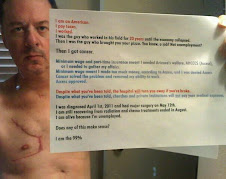For the past week, journalists stationed in Libya's capital city, Tripoli, have pressed government officials for information on Iman al-Obeidi.
The 29-year-old Libyan woman made international headlines last weekend after she burst into a hotel housing the foreign press corps. Visibly bruised, she alleged that she had been kidnapped and sexually assaulted by 15 members of strongman Muammar Gadhafi's armed forces. Libyan security then whisked her away from the battery of cameras and tape recorders.
After the widely publicized incident, Libyan officials kept mum about al-Obeidi's whereabouts, and the country's state-run media carried out an aggressive smear campaign painting her as a prostitute and madwoman. Her family, however, said that she was a post-graduate law student studying in Tripoli.
But al-Obeidi emerged from seclusion Monday to offer more public testimony about her alleged gang-rape and captivity.
"I showed to the journalists my hands and legs. I was bound and tied up. I was beaten and tortured," she told CNN's Anderson Cooper through a translator in an interview that aired in part on his Monday prime time show, according to a transcript the network provided to The Cutline. "For two days they violated my freedom ... I want to convey to the journalists that the brigades who are supposed to protect people, look what they did to me."
In addition to the Cooper interview, Obeidi recounted the story of her initial detention to NPR and a Libyan opposition satellite channel. Her ordeal began, she said, when soldiers stopped her taxi at a checkpoint in Tripoli.
Once she was detained, she said, the assaults began. "They had my hands tied behind me," she told Cooper, "and they had my legs tied, and they would hit my while I was tied, and bite me on my body, and they would pour alcohol in my eyes so that I would not be able to see, and they would sodomize me with their rifles, and they would not let us go to the bathroom. We were not allowed to eat or drink. This is because I resisted them and tried to stop them from raping me."
During her second imprisonment--after she burst into the hotel lobby full of journalists--al-Obeidi said that she was pressured to recant the rape claims on Libyan state television. She refused, she said, "because the TV station does not tell the truth."
Details of al-Obeidi's release remain sketchy. Her present location is unconfirmed, but she reportedly made a second attempt to speak with journalists at the hotel this past weekend and was again rebuffed.
"There is no safe place for me in Tripoli," she told Cooper. "All my phones are monitored. Even this phone I am speaking on right now is monitored and I am monitored. And yesterday, I was kidnapped by a car and they beat me in the street and then brought me here after they dragged me around. They told me whenever you leave the house we will do this to you, meaning that I was not allowed to leave the house or see the journalists. I had asked to see the journalists. They beat and hit me and sent me back. Tell all the human rights organizations to return me safely to my family."
Also on Monday, a Libyan government spokesman told the Associated Press that al-Obeidi had made a deal with the country's attorney general that prohibited her from speaking with reporters.
"She broke her agreement with the attorney general by trying to speak to the media and was taken away," the spokesman told the newswire, which also spoke with a woman the government claimed was an attorney representing al-Obeidi in the rape case. "She doesn't want to speak to journalists because she said she wants to get justice through the courts," the woman told the AP. "But she is comfortable, living with her sister in Tripoli, and is in good spirits."
Al-Obeidi has come forward with her story at a critical juncture in the efforts of Gadhafi's regime to clamp down on the work of the foreign media. Journalists working out of Tripoli say they are contending with tightly monitored and almost surreal working conditions. Some even fear that their hotel-prepared food is being spiked with sedatives, according to NPR.
"That was why the outburst of Iman al-Obaidi ... was so revelatory," writes Liz Sly in The Washington Post. "In an instant, she crystallized the harsh realities of the Libya the government goes to such lengths to prevent journalists from seeing."
It's also possible that the widespread media exposure saved al-Obeidi's life.
The New York Times' David Kirkpatrick, who is on the ground in Tripoli, notes: "Thanks to the publicity in her first interviews ... she may have gotten off easy. Others in her situation, human rights advocates say, are typically confined for years in so-called rehabilitation facilities, subjected to unscientific virginity tests, deprived of any entertainment or education except lessons in Islam, and subjected to solitary confinement or handcuffs for any sign of resistance to authority."
As for al-Obeidi, she told Cooper she has constant nightmares of death and wishes to leave Tripoli, but is no longer afraid.
(Jerome Delay/AP)

























No comments:
Post a Comment